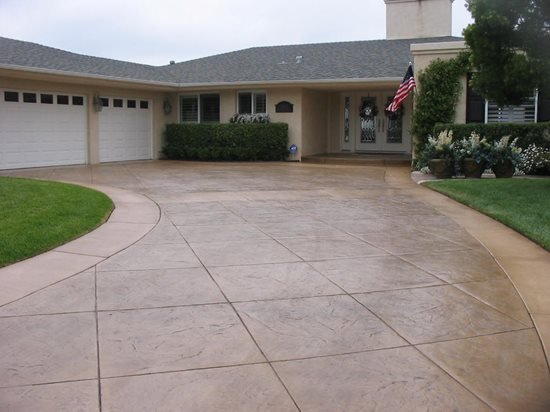For homeowners, an aesthetically pleasing driveway is one of the most important house improvements. It doesn’t only attract and charm visitors or passersby, but it also increases the overall concrete home value costs. It is important to think deeply about this important investment since the materials you select to pave your driveway would also be an affecting factor for the concrete job’s costs and could possibly result in spending too much.
A concrete driveway may be able to last for about 30 years and continue to cure and harden if it is being properly maintained. In fact, some may suggest that older concrete is much stronger than younger or newer concrete. Although concrete is known for being easily maintained, there are still some things to keep in mind such as concrete soil erosion on either side of the driveway, avoiding using de-icing chemicals, and opting for a sealer to protect their driveway concrete investment.
Doing some quick research about the project will definitely prove helpful. Taking a look at some national average costs may also give you a general idea of the possible costs. Although most averages and estimates really don’t affect the final price including the local concrete labor hourly rates, driveway material costs, and any local permits required for the Bend concrete project. According to a certain source, homeowners paid for concrete costs pad installation in Deschutes county is between $2,002.00 and $2,198.00.
Factors That May Affect Concrete Driveway Cost
As mentioned earlier, the estimates found online are not really the possible final cost, it only aims to provide a general idea for the cost. There could be many more things to keep in mind that could eventually influence the concrete driveway costs. Naturally, the size, thickness, and complexity of the project costs would be leading to the possible resulting concrete costs. Here are the details:
Driveway Size Cost
For a single-car driveway that is 10 feet by 20 feet, it could cost $800 to $1,600, meanwhile, for a larger 24-foot by 24-foot driveway, it could average $2,300 to $4,600. It is also widely known that if you plan to stamp your concrete then you should be prepared to pay higher costs than that.
Typical concrete driveways are only about 4 inches thick, although you may need to increase the thickness to withstand the extra weight if you have heavy vehicles or equipment to park.
Concrete Design Costs
Some homeowners may prefer to get different unique concrete shapes or design aside from the plain rectangle driveway and square driveway. Using a specific shape may also be more effective costs at times. For example, depending on the space, you may prefer to add a half circle for better access, or you could choose an L-shape to access a garage that doesn’t directly face the street.
In such cases, costs may go up. Any curved designs usually add up more driveway cost to install concrete since a contractor must specially build the forms, so the edges are smooth and durable. Similarly, if the project is taking place in a sloped area that cannot be leveled, then more effort of labor, time, and energy would be put into the work, resulting in higher prices.
Labor Driveway Cost
Most of the concrete driveway costs usually go to the labor. In fact, some may argue that half of the concrete driveway cost is for the labor since laborers are the ones responsible for preparing the concrete site, building the concrete forms, adding rebar if needed, laying the concrete, then smoothening the concrete out. After the whole process of curing the concrete, the forms are then removed.
Driveway Permit Cost
Although in some places and situations permits aren’t really required, it is still a great idea to check with the local concrete authorities in Bend. Typically, if a concrete apron has already been installed in a subdivision, the city is likely to waive any permits. If not, the average permit prices are $50 to $200. The concrete contractors are also the ones usually responsible for processing these documents if necessary.
Driveway Site Conditioning
Similarly, with the labor, new concrete construction driveways sometimes require extra effort to prepare the site for pouring concrete. Trees and rocks will be removed, and uneven ground is leveled. There may also be a need to remove an old driveway is a different kind of site preparation for a new concrete driveway.
Additional Costs Of Concrete Driveways
The ones above are more of the primary and typical factors that could potentially influence the costs of concrete driveways, while the next few indicators are only needed when the terrain requires extra concrete work or materials to ensure the driveway is stable, and some specialty designs could be added at an additional concrete driveways cost.
Driveway Border
One of the things some homeowners do to their driveways in order to add some style and a bit of design is adding some borders around the edges of their concrete driveways, be it brick or stone borders. These two materials, bricks, and paving stones are great additions in order to boost up the appearance and charm of the concrete driveway. This may not be a necessity but it could still be a wise choice for a small price.
Rebar Driveway Cost
Rebar may also be required if the driveway of concrete is expected to lift some heavy loads or expect there to be some traffic on the concrete driveway. Rebar or wire mesh is applied as a grid inside the concrete forms where the wet concrete is poured on top to form a reinforced concrete and stronger concrete surface. Naturally having the concrete rebar or wire mesh laid out will also be requiring some additional charges since additional materials and labor are required.
Sealing Driveway Cost
Sealing is a part of the finishing touches for the concrete driveway in order to keep your driveway in great shape longer. Sealing the concrete prevents cracks from appearing, protects it from de-icing chemicals, and lengthens its lifespan. There could be some concrete companies that also include the sealing in the quote they provide so it is a great idea to ask just in case. If you have chosen a specialty stain, then it must be sealed to protect the concrete color.

